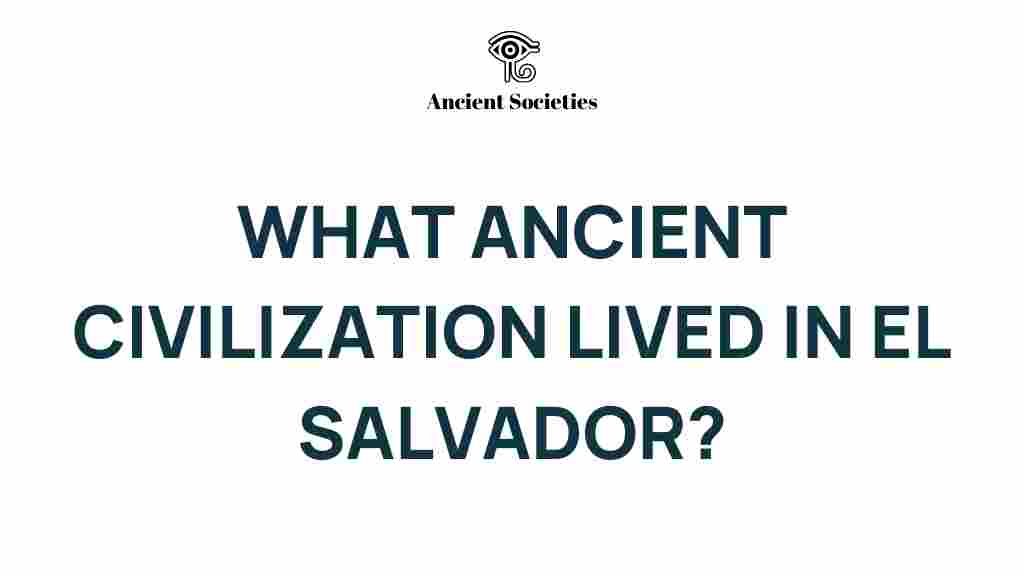Unveiling the Secrets of El Salvador’s Ancient Civilization
El Salvador, a small yet vibrant country in Central America, is often overlooked when it comes to the rich tapestry of Mesoamerican history. The remnants of ancient civilizations, particularly those influenced by the Mayan culture and indigenous tribes, are scattered throughout the landscape, offering a glimpse into the past. This article will explore the archaeology, history, and cultural heritage of El Salvador’s ancient civilization, uncovering the secrets hidden within its ancient ruins.
The Rich Tapestry of Mesoamerican History
Mesoamerica is a region that includes Mexico and parts of Central America, known for its complex societies and advanced cultures that thrived long before European contact. El Salvador, though smaller than its neighbors, played a significant role in this historical narrative. The ancient civilization here was influenced by various indigenous tribes, particularly the Mayans, who left a lasting impact that can still be felt today.
Key Features of El Salvador’s Ancient Civilization
Understanding the ancient civilization of El Salvador involves exploring several key features:
- Geographic Diversity: The country’s varied terrain includes mountains, volcanoes, and coastal plains, which shaped the lifestyles of its inhabitants.
- Rich Agricultural Practices: The fertile soil allowed for the cultivation of maize, beans, and cacao, staples of the ancient diet.
- Trade Networks: Ancient civilizations in El Salvador were part of extensive trade routes that connected them with other Mesoamerican cultures.
- Spiritual Beliefs: The indigenous tribes had a rich tapestry of mythologies and deities, influencing their daily lives and agricultural practices.
Exploring Ancient Ruins in El Salvador
El Salvador is home to several significant archaeological sites that provide insight into its ancient civilization:
- Tazumal: Located in the municipality of Chalchuapa, Tazumal is one of the most important Mayan ruins in the country, featuring a large pyramid and various ceremonial structures.
- San Andrés: This site includes a series of temples and plazas, showcasing the architectural prowess of the ancient civilization.
- Joya de Cerén: Often referred to as the “Pompeii of the Americas,” this UNESCO World Heritage site offers a well-preserved glimpse into daily life during the Mayan civilization, buried under volcanic ash.
- El Trapiche: A lesser-known site that provides insight into the agricultural practices of the indigenous tribes.
The Importance of Archaeology in Understanding Ancient Civilization
Archaeology plays a crucial role in uncovering the secrets of El Salvador’s ancient civilization. Through meticulous excavation and research, archaeologists have been able to piece together the lives of the indigenous tribes and their interactions with the Mayans. Key archaeological methods include:
- Excavation: Carefully digging through layers of soil to uncover artifacts, structures, and other evidence of past human activity.
- Carbon Dating: Determining the age of organic materials to establish timelines for when certain civilizations thrived.
- Artifact Analysis: Studying tools, pottery, and other objects to understand the daily lives, trade practices, and cultural beliefs of ancient peoples.
Step-by-Step Process for Visiting El Salvador’s Archaeological Sites
If you’re interested in exploring El Salvador’s ancient civilization firsthand, here’s a step-by-step guide to visiting its archaeological sites:
- Plan Your Trip: Research the best times to visit El Salvador, considering weather and local festivals.
- Select Your Sites: Choose which archaeological sites you want to visit based on your interests.
- Book Local Guides: Hiring a knowledgeable guide can enhance your experience by providing historical context and insights.
- Prepare for Your Visit: Pack essentials like water, sun protection, and comfortable shoes for exploring the ruins.
- Engage with the Culture: Take time to learn about the local customs and interact with the indigenous communities.
Troubleshooting Tips for Visitors
While exploring the ancient ruins of El Salvador can be an enriching experience, it’s essential to be prepared for various challenges:
- Language Barrier: While many locals speak Spanish, not everyone is fluent in English. Learning a few basic phrases can go a long way.
- Weather Conditions: El Salvador can be hot and humid. Stay hydrated and plan your visits during cooler parts of the day.
- Safety Precautions: Like any travel destination, be aware of your surroundings and follow local advice for safety.
The Legacy of Indigenous Tribes and Mayan Culture
The ancient civilization of El Salvador is deeply intertwined with the legacy of its indigenous tribes and the influence of Mayan culture. The traditions, languages, and practices of these groups are alive today, preserving their cultural heritage. Key aspects include:
- Languages: Many indigenous languages, such as Nahuatl and Pipil, are still spoken by communities today.
- Traditional Crafts: Artisans continue to practice ancient crafts, including pottery, weaving, and wood carving, which showcase their rich cultural heritage.
- Festivals: Cultural celebrations often blend ancient traditions with modern practices, providing insight into the continuity of indigenous beliefs.
Conclusion: The Enduring Mystique of El Salvador’s Ancient Civilization
The exploration of El Salvador’s ancient civilization reveals a rich history shaped by the Mayan culture and indigenous tribes. Through archaeological endeavors and the preservation of cultural heritage, we can uncover the secrets of the past and appreciate the complexity of these ancient societies. Whether you are an archaeology enthusiast, a history buff, or simply a curious traveler, El Salvador offers a unique opportunity to connect with its ancient roots.
For more information on the archaeological sites of El Salvador and their significance in Mesoamerican history, check out this detailed guide. If you’re interested in further exploring the cultural heritage of indigenous tribes, visit this resource for comprehensive insights.
In conclusion, the ancient civilization of El Salvador is a treasure trove of history waiting to be uncovered. As we delve into the ruins and stories of the past, we not only learn about those who came before us but also gain a deeper appreciation for the vibrant cultures that continue to thrive in this beautiful country.
This article is in the category Archaeology and created by AncientSocieties Team
